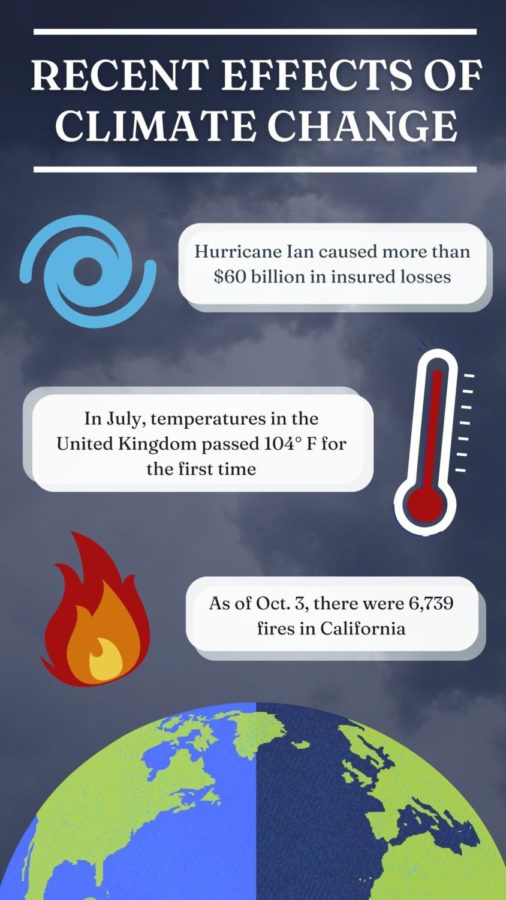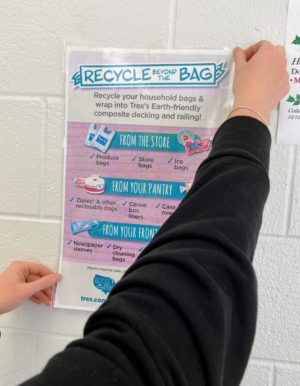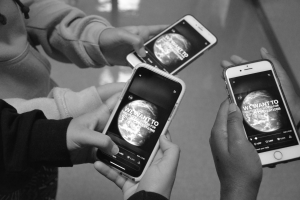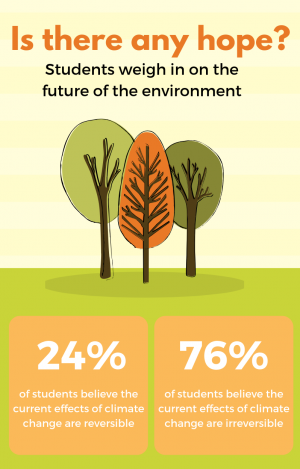Staff Editorial: Climate crisis requires our involvement
Many recent destructive events have been a result of worsening climate change.
November 29, 2022
As Florida grapples with the aftermath of Hurricane Ian, Europe recovers from one of its hottest summers on record and wildfires burn constantly across California, the future holds the potential of greater storms and hotter temperatures. Even temperate Virginia is expected to have rising temperatures across all seasons and more intense precipitation in coming years, per the Fairfax County Office of Environmental and Energy Coordination. With so many recent signs of the climate crisis in recent months, now has never been a better time to act.
The destruction of Hurricane Ian has been the most recent indication of our planet’s worsening health. According to NASA, warmer weather allows for hurricanes to hold more water vapor and therefore create heavier rainstorms, hurricanes and typhoons across the world. Over the past 40 years, hurricanes have been increasing in intensity, especially for the north Atlantic region, and their numerous ramifications, including property damage and fatality rates, will only worsen.
Climate change poses a risk to every continent. Europe’s heat waves this summer have set record high temperatures, leading to drought, water scarcity and wildfires across the continent. In Africa, drought and global warming have also caused dangerous levels of water scarcity. Asia, which is the origin of half the world’s greenhouse emissions, faces increasingly extreme weather every year. Antarctica has had glaciers and ice shelves melting into the ocean for years. The 2019 wildfires in the Amazon Rainforest in South America spurred the effects of climate change with the release of so much carbon.
The 6,739 wildfires in California this year as of Oct. 3, according to the Department of Forestry and Fire Protection, have also often been a result of human carelessness. Reckless cigarette disposal and unattended campfires make it easy for a spark to spread on air that is drier and warmer from climate change. As hundreds of Californians are forced to leave their homes, firefighting agencies on the local, state and federal level all work to fight fires that are often too large to handle.

Even when people believe in climate change, many choose to stay passive about the topic, believing the situation is not dire enough to act. But the situation cannot be treated as a distant event on the horizon. Climate change has been directly affecting every person on Earth—the situation calls for action now.
Many scientists agree that at this point, the climate crisis cannot be reversed—we can only attempt to prevent things from getting worse. One local plan of action, Fairfax County’s Community-wide Energy and Climate Action Plan, aims to cut greenhouse gas emissions in half by 2030. It lists activities for county residents to complete to achieve this goal like managing waste, using sustainable energy sources, cutting vehicular fuel use and conserving nature. But the youth may be the most important contributor to healing our planet.
Small actions like listening to and acknowledging the news, turning off the lights, using reusable water bottles and carpooling to school are ways even students can help manage the Earth’s health. Getting involved in or volunteering for environmental groups like the Students for Environmental Activism club and The Nature Conservancy are also methods of spreading awareness and educating oneself.
Although individually one person’s impact may have little direct impact, cooperative climate action will lead to more natural resource preservation and less greenhouse gas emissions, according to the Climate and Clean Air Coalition. We have the power to shape the world we will live in, and we should choose to live in a safer, happier future.
We should be scared of what the world might become. But we should use our fear as motivation instead of an obstacle and work to be more environmentally conscious. It says it in the name: global warming is a global issue, one that humanity needs to work together to remedy.







